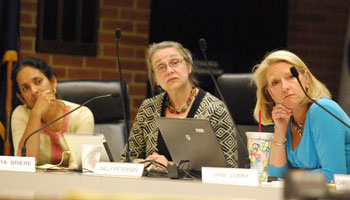Ann Arbor city council meeting (Sept. 3, 2013): Two significant items on the council’s agenda were postponed so that more committee work could be done on the issues: revisions to the ordinance (Chapter 7) regulating tax increment finance (TIF) capture by the Ann Arbor Downtown Development Authority; and revisions to the council’s internal rules.

Sumi Kailasapathy (Ward 1), Sabra Briere (Ward 1) and Sally Petersen (Ward 2). Despite Ann Arbor’s reputation, on this occasion councilmembers appeared to be leaning to the right. The meeting featured public commentary that recalled a standard political joke about Ann Arbor during football season: “Fake left, run right.” (Photos by the writer.)
Both issues also had been postponed from previous meetings. However, the committees that were supposed to have provided more specific recommendations to the full council prior to Sept. 3 did not accomplish that work.
After the Sept. 3 council meeting, both of the relevant committees subsequently met. An update on their work is included in this council meeting report.
The DDA ordinance revisions have already been given initial approval by the council and are awaiting a final vote. The amendments to Chapter 7 include various changes to governance, including term limits for board members, as well as clarifications to the existing language on TIF capture. The amendments would enforce the existing language of the ordinance in a way that has an impact on the DDA’s TIF revenue that would roughly match the DDA’s projected revenues in its 10-year planning document.
However, since that 10-year document was last updated, the amount of new construction in the DDA district has resulted in significant increases in the taxable value on which TIF is computed. About $1 million a year is at stake – which would be distributed to the other jurisdictions whose taxes the DDA captures, instead of being collected by the DDA. The joint committee of DDA board members and city council members met on Sept. 10, and the group appeared to be ready to recommend that the council table the initially-approved ordinance changes and start from scratch, likely shedding the proposed changes to governance.
The approach the committee is now taking would remove the current Chapter 7 language expressing restrictions on the DDA’s TIF revenue, and replace it with a “cap” that would have a built-in annual increase. Among the scenarios the committee is weighing would be a cap set at a high-enough level that it would likely have no impact on the amount of the DDA’s TIF revenue, compared to the amount the DDA is receiving under its own current interpretation of the ordinance, which is disputed.
While the Sept. 3 postponement of the DDA-related ordinance was dispatched quickly, later in the meeting the council engaged in a substantial debate on an appointment to the DDA board – that of Al McWilliams. With only nine councilmembers present and his confirmation dubious – because it needed six votes on the 11-member council – mayor John Hieftje withdrew the nomination.
The council’s rules committee also met on Sept. 10 and reviewed revisions that had previously been recommended. Basing its work on a debate that the entire council had on July 15, 2013, the committee decided that none of the council rules on the length of speaking turns (for the public or for councilmembers) or for reserving time to speak at the start of meetings would be changed from the current rules. Among the proposed changes that survived committee discussion included: (1) adding public commentary at work sessions, (2) re-ordering the agenda to place nominations and appointments near the start of the meeting, and (3) prohibiting use of personal electronic communications devices while at the council table.
The council will take up the DDA ordinance as well as the internal rules issue at its next meeting on Sept. 16.
Other business handled by the council on Sept. 3 included passage of a resolution calling for work on better cleanup standards for 1,4-dioxane – which came only after lengthy debate about possibly postponing it in order to strengthen the language and seek the advice of additional stakeholders.
The council also passed a resolution recommended by the city’s energy commission, to direct city staff to develop a pilot program with DTE for a “community solar” project. Another resolution recommended by the energy commission failed to win council approval, however. It would have directed the city’s employment retirement system to divest from fossil fuel companies.
In land-related business, the council approved the city’s participation in two deals related to the city’s greenbelt program. Councilmembers also gave approval to a Hampton Inn project on Jackson Road and initial approval to a drive-thru to be constructed at a Shell/Tim Hortons at Eisenhower and Ann Arbor-Saline Road.
As part of city administrator Steve Powers’ report to the council, he mentioned that a memo on the review of the city’s crosswalk ordinance would be forthcoming. That memo was subsequently released. [Full Story]




